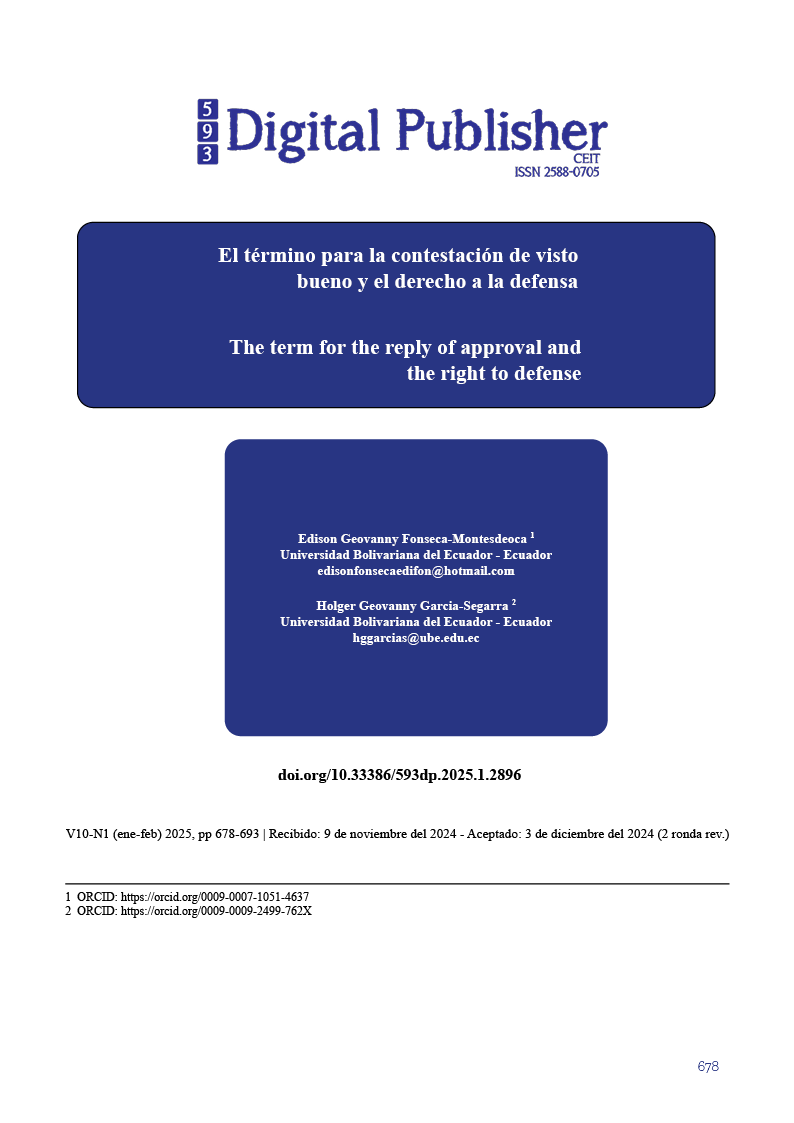The term for the reply of approval and the right to defense
Main Article Content
Abstract
The research examines the two-day term established by Ministerial Agreement No. MDT- 2021-219 and Article 621 of the Labor Code to respond to a request for approval in the Ecuadorian labor context. This short term has raised concerns about its compatibility with the right to defense, enshrined in the Constitution of Ecuador and the American Convention on Human Rights. The study employs a qualitative methodology, analyzing relevant regulations, doctrines, and jurisprudence. It highlights the principle of legal reservation, which requires certain matters to be regulated by law to guarantee legal security. However, it questions whether the regulatory specification of the two-day term violates this principle. The right to defense is crucial in labor relations due to the subordination of the worker to the employer. The research concludes that the two-day term may be insufficient to prepare an adequate defense, affecting procedural guarantees. It mentions that the Inter-American Court of Human Rights has emphasized the need for reasonable terms in procedures that affect labor rights. It is recommended to review the regulation to ensure that defense rights are respected, maintaining a balance between procedural speed and protection of labor rights, in accordance with constitutional principles and international standards.
Downloads
Article Details

This work is licensed under a Creative Commons Attribution-NonCommercial-ShareAlike 4.0 International License.
1. Derechos de autor
Las obras que se publican en 593 Digital Publisher CEIT están sujetas a los siguientes términos:
1.1. 593 Digital Publisher CEIT, conserva los derechos patrimoniales (copyright) de las obras publicadas, favorece y permite la reutilización de las mismas bajo la licencia Licencia Creative Commons 4.0 de Reconocimiento-NoComercial-CompartirIgual 4.0, por lo cual se pueden copiar, usar, difundir, transmitir y exponer públicamente, siempre que:
1.1.a. Se cite la autoría y fuente original de su publicación (revista, editorial, URL).
1.1.b. No se usen para fines comerciales u onerosos.
1.1.c. Se mencione la existencia y especificaciones de esta licencia de uso.
References
Altamirano, D. (2022). Tipo penal de receptación y el principio de inocencia en el derecho a la defensa. IUSTITIA SOCIALIS. https://doi.org/https://doi.org/10.35381/racji.v7i2.2028
Alvarado, J. (2022). Las garantías del debido proceso en los procedimientos administrativos disciplinarios en Ecuador. Sociedad y Tecnología. https://doi.org/https://doi.org/10.51247/st.v5iS1.233
Arroyo, N. (2020). Debido proceso y motivación de las decisiones en el proceso penal dominicano. https://revistas.unam.mx/index.php/rfdm/article/view/76255
Baculima, G. (2020). Derecho a la defensa en la detención con fines investigativos.
Dialnet. https://dialnet.unirioja.es/servlet/articulo?codigo=7408556
Bardales, L. (2023). El debido proceso como derecho fundamental en el sistema de justicia peruano. Ratio Iure. https://doi.org/https://doi.org/10.51252/rcri.v3i1.495
Bravo, S. (2021). La motivación en sentencias de los juzgados de primer nivel del cantón Cuenca: análisis de los fallos de la acción de protección durante el 2020. https://fipcaec.com/index.php/fipcaec/article/view/490
Cadena, M. (2022). El in dubio pro operario y su correcta aplicación para los administradores de justicia. USFQ. https://doi.org/https://doi.org/10.18272/ulr.v9i2.2754
Castillo, G. (2020). El régimen sancionador en las contrataciones con el Estado en contraposición a las garantías mínimas previstas en el régimen sancionador contemplado en el Texto Único Ordenado de la Ley de Procedimiento Administrativo General. https://dialnet.unirioja.es/servlet/articulo?codigo=7793089
Díaz, E. (2020). La defensa técnica del procesado, derecho a la defensa y debido proceso. Dialnet. https://dialnet.unirioja.es/servlet/articulo?codigo=8964762
Flores, J. (2022). La estabilidad de la competencia para la potestad sancionadora y las autoridades del procedimiento administrativo disciplinario de la Ley del Servicio Civil. Scielo. https://doi.org/https://doi.org/10.32870/dgedj.v7i21.488
Galarza, C. (2021). El modelo de MacCormick como esquema de motivación para la aplicación de estándares de la CIDH en la fijación de la prisión preventiva.
CIENCIA. https://doi.org/https://doi.org/10.29076/issn.2528- 7737vol14iss37.2021pp1-14p
Rodríguez, I. (2020). Procedimiento administrativo de visto bueno. Enfoque constitucional a la seguridad jurídica y al debido proceso. Dialnet. https://dialnet.unirioja.es/servlet/articulo?codigo=8964698
Rojas, G. (2020). Terminación de la relación laboral: la figura jurídica del Visto Bueno y su impugnación en Ecuador. Rekaciones laborales y derecho del empleo. https://ejcls.adapt.it/index.php/rlde_adapt/article/view/892
Tajadura , J. (2021). El Estado de derecho frente al Covid: reserva de ley y derechos fundamentales. RVAP. https://doi.org/https://doi.org/10.47623/ivap- rvap.120.2021.04



